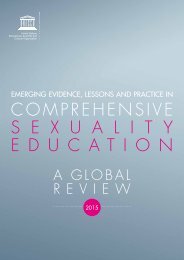Teacher
1WrsFvH
1WrsFvH
You also want an ePaper? Increase the reach of your titles
YUMPU automatically turns print PDFs into web optimized ePapers that Google loves.
pre-service education, certification, deployment,<br />
continuing professional assessment and development,<br />
career progression, and working conditions and<br />
environments. In Southeast Asia, the momentum has<br />
been building for early childhood teacher development<br />
and management. During the Strategic Dialogue of<br />
Education Ministers held in Vientiane, Lao PDR, in<br />
September 2014, SEAMEO Member Countries decided<br />
to make achieving universal early childhood education<br />
by 2030 one of the seven priority areas for cooperation.<br />
They also prioritized teacher education through the<br />
comprehensive, strategic, and practice-based reform of<br />
teacher development and management systems, with a<br />
view to making it a profession of first choice for qualified<br />
and dedicated professionals.<br />
For the purposes of these guidelines, the term “early<br />
childhood education” is used to refer to Level 0 of the<br />
International Standard Classification of Education (ISCED)<br />
to emphasise the intentionally educational aspects<br />
of early childhood care and education programmes,<br />
while understanding that quality programmes for<br />
young children must take a holistic approach to child<br />
development and learning. The ISCED Level 0 recognizes<br />
both programmes for children aged 0–2 years and<br />
early childhood education for children aged 3 years<br />
until the age for entering primary education. The latter,<br />
whether publicly or privately run and whether centre-,<br />
community-, or home-based, are primarily designed to<br />
support early cognitive, physical, social, and emotional<br />
development through play-based and child-centred<br />
approaches. These guidelines for early childhood teacher<br />
development and management, therefore, focus largely<br />
on the years of education immediately prior to formal<br />
primary schooling, which are more and more commonly<br />
coordinated and implemented by Ministries of Education<br />
across the region.<br />
Once endorsed by the Ministers of Education in<br />
Southeast Asia, the expectation is that these guidelines<br />
will be useful to “those engaged in devising international,<br />
national, regional, local, sectoral, workplace (private and<br />
public), and home-based ECCE policy and practice and<br />
organization of ECCE services” as with the aforementioned<br />
ILO Policy Guidelines (p. 1) — and will be of particular use<br />
in assisting Education Ministries, as well as other relevant<br />
ministries and agencies in both professionalizing early<br />
childhood teachers and promoting better working<br />
conditions for them.<br />
© UNESCO/S. Chaiyasook<br />
Southeast Asian Guidelines for Early Childhood <strong>Teacher</strong> Development and Management 3



